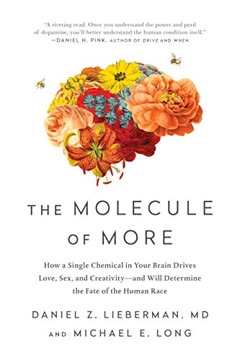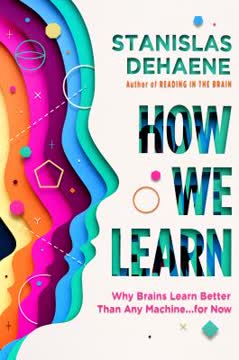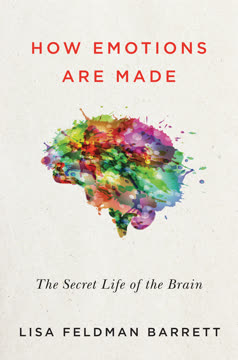Key Takeaways
1. Emotions are not universal reactions but constructed experiences
Emotions are not reactions to the world; they are your constructions of the world.
Constructed emotions. The theory of constructed emotion proposes that emotions are not innate, universal reactions triggered by external events. Instead, they are experiences that our brains actively construct using past experiences, cultural knowledge, and bodily sensations. This construction process involves:
- Predictions: The brain constantly predicts what sensations to expect based on past experiences
- Concepts: We use emotion concepts learned from our culture to categorize and make sense of our sensations
- Body budget: Internal sensations from our body's physiological state influence our emotional experiences
Cultural variation. This view explains why emotions can vary significantly across cultures and individuals. Different societies may construct and experience emotions in distinct ways based on their unique concepts and contexts.
2. The brain predicts and simulates reality, including emotions
You are an architect of your experience.
Predictive brain. Our brains don't passively react to the world, but actively predict and construct our reality. This includes:
- Sensory experiences: The brain fills in gaps and makes assumptions about what we see, hear, and feel
- Emotions: We simulate emotional experiences based on past instances and current context
- Actions: The brain predicts necessary actions before we're consciously aware of deciding to move
Simulation is key. This predictive, simulating nature of the brain allows us to:
- Imagine future scenarios
- Empathize with others
- Learn from past experiences
- Efficiently process the vast amount of sensory input we receive
3. Concepts shape our perceptions and experiences of emotions
Words seed your concepts, concepts drive your predictions, predictions regulate your body budget, and your body budget determines how you feel.
Conceptual knowledge. Our emotion concepts, learned from our culture and experiences, profoundly shape how we perceive and experience emotions. This involves:
- Categorization: We use concepts to group diverse sensations and situations into meaningful emotional experiences
- Language: Emotion words provide a framework for organizing our emotional concepts
- Cultural variation: Different cultures may have unique emotion concepts, leading to diverse emotional experiences
Expanding concepts. Developing a rich set of emotion concepts can enhance emotional intelligence and well-being by:
- Allowing for more nuanced emotional experiences
- Improving emotion regulation abilities
- Facilitating better communication about emotions
4. Interoception and body budgets influence emotional experiences
Interoception is your brain's representation of all sensations from your internal organs and tissues, the hormones in your blood, and your immune system.
Body-brain connection. Our internal bodily sensations, known as interoception, play a crucial role in emotional experiences:
- Body budget: The brain constantly regulates our body's resources, creating a "budget" of energy
- Affect: Our general sense of feeling (pleasant/unpleasant, calm/agitated) arises from our body budget
- Emotion construction: We use concepts to make meaning of our interoceptive sensations, constructing specific emotions
Implications. Understanding the body-brain connection in emotions suggests:
- Physical health can significantly impact emotional well-being
- Practices that regulate the body (e.g., exercise, sleep, diet) can influence emotional experiences
- Emotional disorders may involve disruptions in interoception and body budgeting
5. Emotional granularity enhances well-being and emotional intelligence
The more finely grained your vocabulary, the more precisely your predicting brain can calibrate your budget to your body's needs.
Emotional vocabulary. Developing a rich, nuanced emotional vocabulary can lead to:
- More precise emotional experiences
- Better emotion regulation
- Improved communication about emotions
- Enhanced overall well-being
Practical applications. To increase emotional granularity:
- Learn new emotion words, including from other languages
- Practice identifying and labeling emotions more specifically
- Engage with diverse experiences and perspectives to broaden your emotional repertoire
6. The classical view of emotions as distinct entities is scientifically unfounded
Emotions are real, but not in the objective sense that molecules or neurons are real. They are real in the same sense that money is real—that is, hardly an illusion, but a product of human agreement.
Challenging assumptions. The classical view of emotions as distinct, universal entities with specific neural circuits and expressions is not supported by scientific evidence:
- No consistent "fingerprints": Research has failed to find consistent patterns of neural activity, physiology, or facial expressions for specific emotions
- Variation is the norm: Instances of the same emotion category can vary widely in their physical manifestations
- Context matters: How we experience and perceive emotions depends heavily on context and concepts
Implications. Recognizing the constructed nature of emotions can lead to:
- More nuanced understanding of emotional experiences
- Reevaluation of how we approach emotional disorders
- Reconsideration of how emotions are understood in fields like law and AI
7. Emotions are social realities, not biological absolutes
Emotions are social reality. We construct instances of emotion in exactly the same manner as colors, falling trees, and money: using a conceptual system that is realized within the brain's wiring.
Social construction. Emotions exist as part of our social reality, similar to concepts like money or laws:
- Collective agreement: Emotions gain their meaning and power through shared understanding in a culture
- Cultural variation: Different societies may construct and experience emotions differently
- Transmission: Emotion concepts are passed down through generations via language and social interaction
Implications. Viewing emotions as social realities:
- Challenges the idea of universal, biologically determined emotions
- Highlights the role of culture in shaping emotional experiences
- Suggests that emotional experiences can change as societies evolve
8. The legal system's understanding of emotions needs updating
To believe otherwise is a fiction that is not supported by the architecture of the brain.
Outdated assumptions. Many legal concepts about emotions are based on outdated, essentialist views:
- The idea of "crimes of passion" assumes emotions override rationality
- Judging remorse in defendants assumes universal emotional expressions
- The concept of emotional harm as less serious than physical harm ignores the body-brain connection
Needed updates. A more scientifically grounded approach to emotions in law could:
- Recognize the constructed nature of emotional experiences
- Account for cultural variations in emotional expression and interpretation
- Consider the physical impacts of emotional experiences
9. Animals likely don't experience human-like emotions
Animals feel affect, but the reality of their emotion is, for the moment, only within ourselves.
Animal affect vs. human emotion. While animals likely experience affect (pleasant/unpleasant feelings), they probably don't have human-like emotions:
- Lack of concepts: Most animals don't have the conceptual system necessary to construct complex emotions
- Affective experiences: Animals can feel pleasure, pain, arousal, and calmness
- Human projection: We often project human-like emotions onto animals due to our tendency for mental inference
Implications. Understanding the difference between animal affect and human emotions:
- Challenges anthropomorphic views of animal behavior
- Suggests a need for more nuanced approaches to animal welfare
- Highlights the unique nature of human emotional experiences
10. A new view of human nature emerges from constructed emotions
The human brain evolved, in the context of human cultures, to create more than one kind of mind.
Beyond essentialism. The theory of constructed emotion suggests a new view of human nature:
- Variation is normal: Human minds can vary significantly based on cultural and individual experiences
- Cultural shaping: Our brains are wired by the cultures we grow up in
- Flexible adaptation: The human brain can create different kinds of minds adapted to diverse environments
Implications. This new view of human nature:
- Challenges ideas of fixed, universal human traits
- Emphasizes the importance of cultural context in understanding human behavior
- Suggests greater potential for individual and societal change
Last updated:
FAQ
What's How Emotions Are Made about?
- Exploration of Emotions: How Emotions Are Made by Lisa Feldman Barrett challenges the classical view of emotions, suggesting they are not hardwired but constructed from basic components.
- Theory of Constructed Emotion: The book introduces the theory that emotions are created by the brain using past experiences and concepts, rather than being triggered by specific stimuli.
- Interoception and Predictions: It discusses how interoception, the brain's representation of internal bodily sensations, plays a crucial role in emotional experiences, highlighting the brain's predictive nature.
Why should I read How Emotions Are Made?
- Rethink Emotions: The book provides a revolutionary perspective, encouraging readers to rethink their understanding of emotional experiences.
- Scientific Insights: Barrett combines psychology, neuroscience, and cultural studies to present a comprehensive view of how emotions are formed.
- Practical Applications: The concepts have real-world implications for mental health, emotional intelligence, and interpersonal relationships.
What are the key takeaways of How Emotions Are Made?
- Emotions Are Constructed: Emotions are not pre-programmed responses but are constructed by the brain using concepts and past experiences.
- Role of Interoception: Interoception is highlighted as a key component in emotional experiences, involving the brain's representation of bodily sensations.
- Cultural Influence: Emotions are shaped by cultural contexts and social agreements, affecting how individuals experience and express emotions.
What is the theory of constructed emotion in How Emotions Are Made?
- Definition of the Theory: Emotions are not innate but are created by the brain through a combination of interoceptive sensations and learned concepts.
- Variability of Emotions: Emotions are highly variable and depend on context, culture, and individual experiences.
- Implications for Understanding Emotions: The theory shifts focus from biological fingerprints to understanding how emotions are constructed in real-time.
How does interoception relate to emotions in How Emotions Are Made?
- Definition of Interoception: Interoception refers to the brain's ability to sense internal bodily states, such as heart rate and digestion.
- Predictive Nature: The brain uses interoceptive sensations to make predictions about the body's needs, leading to emotional experiences.
- Foundation of Affect: Interoception is the basis for affect, influencing how we categorize and interpret our emotions.
How does culture influence emotions in How Emotions Are Made?
- Cultural Variability: Different cultures have unique ways of categorizing and expressing emotions, shaping individual experiences.
- Language and Emotion: Language plays a role in shaping emotional concepts, influencing how emotions are perceived and experienced.
- Social Constructs: Emotions are presented as social realities constructed through shared cultural practices and beliefs.
What is emotional granularity, and why is it important in How Emotions Are Made?
- Definition of Emotional Granularity: It refers to the ability to differentiate between various emotional experiences and label them accurately.
- Benefits of High Granularity: Individuals with high emotional granularity can better regulate their emotions and respond appropriately to situations.
- Cultural Influence: Emotional granularity is influenced by cultural factors and the richness of emotion vocabulary in a person's language.
How can I apply the concepts from How Emotions Are Made in my daily life?
- Master Your Body Budget: Maintaining a balanced body budget through healthy habits supports better emotional regulation.
- Expand Your Emotional Vocabulary: Learning new words for emotions can enhance emotional granularity and lead to more nuanced experiences.
- Practice Recategorization: Recategorizing unpleasant emotions into physical sensations can help manage emotions more effectively.
What are the implications of the theory of constructed emotion for mental health?
- Understanding Mental Illness: Many mental health issues may stem from difficulties in constructing and categorizing emotions.
- Therapeutic Approaches: Therapists can help clients develop better emotional awareness and regulation skills by understanding emotions as constructed.
- Cultural Sensitivity: Considering cultural differences in emotional expression and understanding can benefit mental health professionals.
How does How Emotions Are Made address the myth of universal emotions?
- Challenge to Universality: Barrett argues that the idea of universal emotions is a myth, as emotions are constructed based on cultural concepts.
- Role of Emotion Concepts: Emotion concepts are learned and shaped by social interactions, not innate.
- Research Findings: Studies demonstrate that emotion perception can change based on context and the presence of emotion words.
What are the implications of the theory of constructed emotion for personal responsibility?
- Broader Responsibility: Personal responsibility includes the concepts and predictions that shape actions.
- Cultural Influence: Individuals must consider how their environment influences their predictions and actions.
- Empowerment Through Knowledge: Understanding that emotions are constructed empowers individuals to take control of their emotional experiences.
What are the best quotes from How Emotions Are Made and what do they mean?
- "Emotions are not reactions to the world; they are your constructions of the world.": Emphasizes that emotions are actively created by the brain.
- "You are an architect of your own experience.": Highlights the idea that individuals have agency in shaping their emotional experiences.
- "Social reality is a driving force behind human culture.": Underscores the importance of collective intentionality in shaping emotions and concepts.
Review Summary
"How Emotions are Made" presents a controversial theory challenging traditional views on emotions. Barrett argues emotions are constructed concepts, not universal or innate reactions. Some readers found the ideas thought-provoking and well-supported, praising Barrett's writing style and research. Others criticized the book for repetitiveness, oversimplification, and lack of neuroscientific depth. Many felt Barrett overstated her case against established emotion theories. The book's discussions on cultural differences in emotions and implications for fields like law were considered interesting, though some found later chapters less compelling.
Similar Books









Download PDF
Download EPUB
.epub digital book format is ideal for reading ebooks on phones, tablets, and e-readers.





